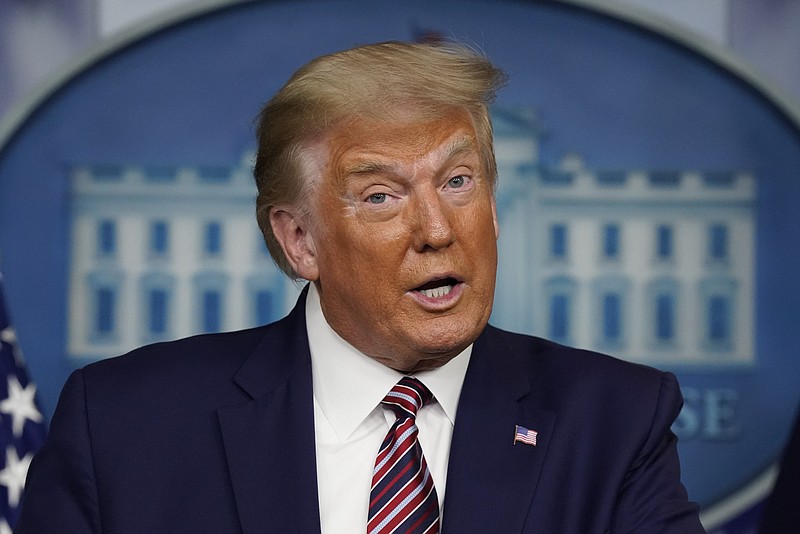On Sunday, The New York Times asked its readers to believe President Donald Trump paid $750 in federal income tax in 2016 and 2017, his first year in office, and that he paid no federal income tax in 10 of the past 15 years.
The newspaper said it would not reveal its sources for the information to protect them.
Trump, for his part, denied the figures, and a spokesman for his business organization said "most, if not all, of the facts appear to be inaccurate," and that, in fact, over the past decade he'd "paid tens of millions of dollars in personal taxes to the federal government."
So what are we left to think?
The newspaper, in its news and opinion columns, has opposed Trump in practically every decision he's made as president and criticized most everything he said since he declared his candidacy for president in 2015. The writing of its staff has made clear the goal of the newspaper in this election year is that he not be returned to office, and the timing of the story's release - two days before the first presidential debate - emphasizes that point.
So is this another false or half-baked conspiracy theory against the president - Russian investigation, Ukraine phone call, "losers"/"suckers" comment, etc. - or should voters give it credence? And if some or most of what has been reported were true, how much will voters care?
So whether the tax numbers are accurate, here is what's not in dispute:
* A president is under no obligation to release his tax returns. Most but not all modern presidents have done so, but no law forces them to do so.
* No president before Trump has been a billionaire businessman. Being a billionaire businessman, he had his fingers in a lot of enterprises from real estate to television to foreign investments. We surmise that his holdings - what can be taxed, what can be considered a loss, what can be written off - would confound the world's top tax accountants. Making the average voter understand how and why Internal Revenue Service (IRS) laws legally allow certain business people to do what they do and pay what they pay is practically impossible.
* The newspaper's reporting, to our reading, has not alleged any illegalities in the amounts he paid to the IRS and the incorrect use of any tax laws he may have used to calculate the amount that he paid. It does mention a disputed $72.9 million tax refund that is the subject of a years-long IRS audit.
* Most of those who cast a ballot for the real estate magnate and reality television star in 2016 knew he was a different animal from a career politician, which perfectly describes his 2020 Democratic opponent, Joe Biden. They accepted his often acerbic, crude language, his three marriages, his alleged affairs, his business dealings (and taxes), his assault on the media and his incessant tweets. They all were a part of who he is, and voters swallowed it for the promise of a better economy, fewer regulations, a stronger military, a wind-down of wars, the exit from bad global agreements, appointment of conservative Supreme Court justices and a reduction in illegal immigration, all of which he delivered.
Beyond the tax numbers, whether it intended to, the newspaper's investigation debunked several conspiracy theories about Trump and his businesses that national media have been reporting as true or largely accurate.
* For four years, Trump has been reported to have business interests - likely illegal ones - with Russia. The newspaper said his tax returns do not "reveal any previously unreported connections to Russia." The only link is the 2013 Miss Universe pageant in Moscow, which was the most profitable such contest under his tenure as co-owner.
* For several years, it has been claimed Trump paid his former lawyer, Michael Cohen, pass-through hush money for supposed former lovers. "The materials obtained by The Times," the report noted, "did not include any itemized payments to Mr. Cohen." However, it added, helpfully, that, "the amount could have been improperly included in legal fees written off as a business expense."
* Since Trump first became a candidate and stated he couldn't release his tax returns because they were under an IRS audit, such claims have been derided, doubted and accused of being false. The Times confirmed the audit, which concerns the $72.9 million tax refund. If the IRS were to rule against him, it would cost him more than $100 million, it was reported.
So, is the newspaper report truth - without a source to back it up - or truthiness, the satirist Stephen Colbert-coined term which is, according to the Merriam-Webster dictionary folks, "a truthful or seemingly truthful quality that is claimed for something not because of supporting facts or evidence but because of a feeling that it is true or a desire for it to be true."
Much of what the national media has ascribed to Trump during his presidential term has been truthiness. We don't doubt whatever is true about the president's income tax returns would surprise or shock some people. Of course, no one will know for sure before the election. And, truth or truthiness, that's just how the newspaper planned it.
